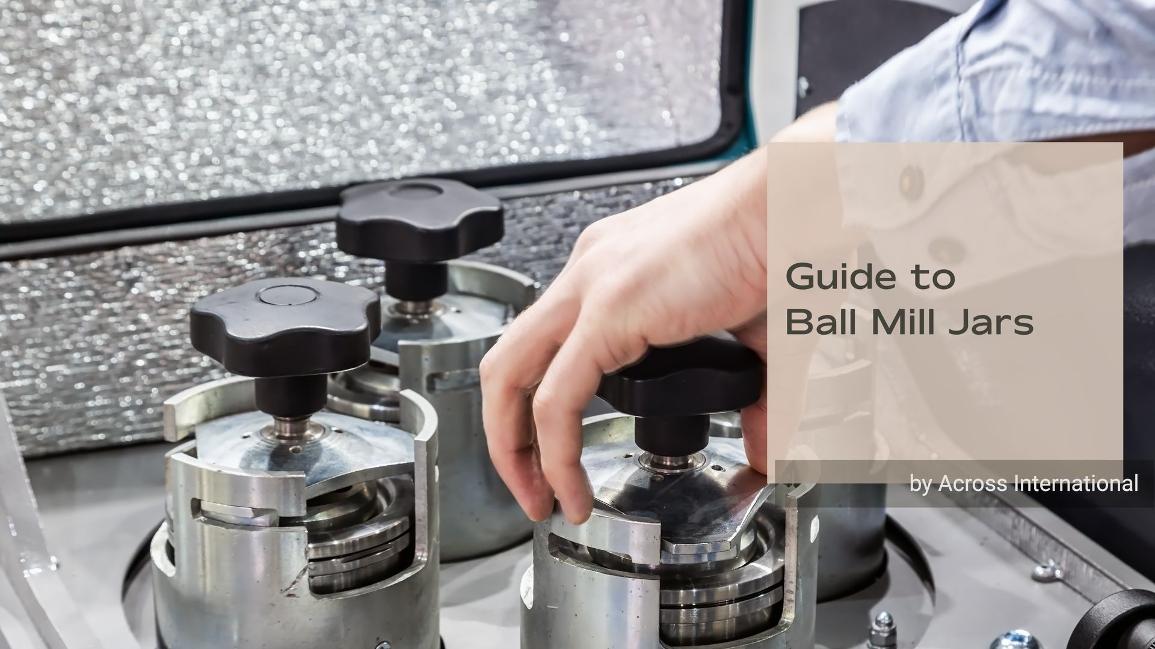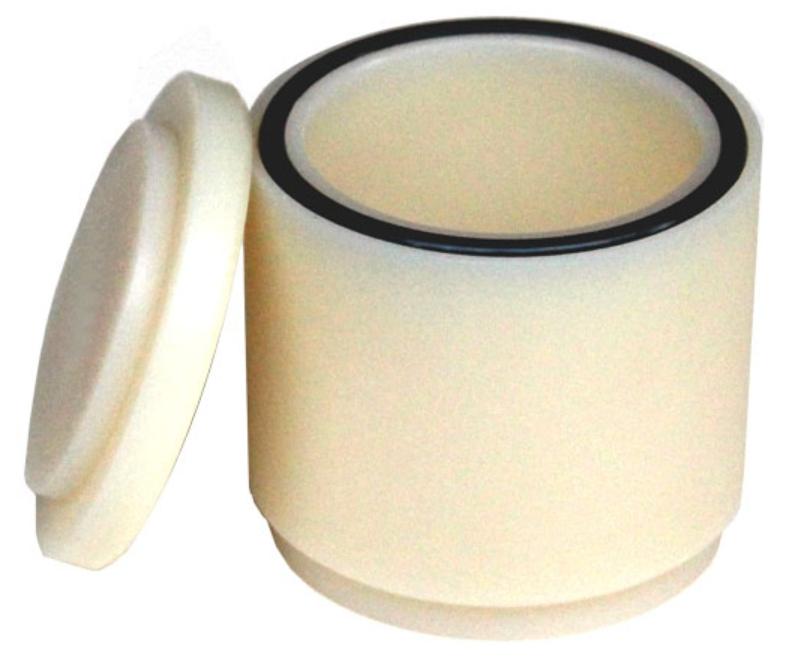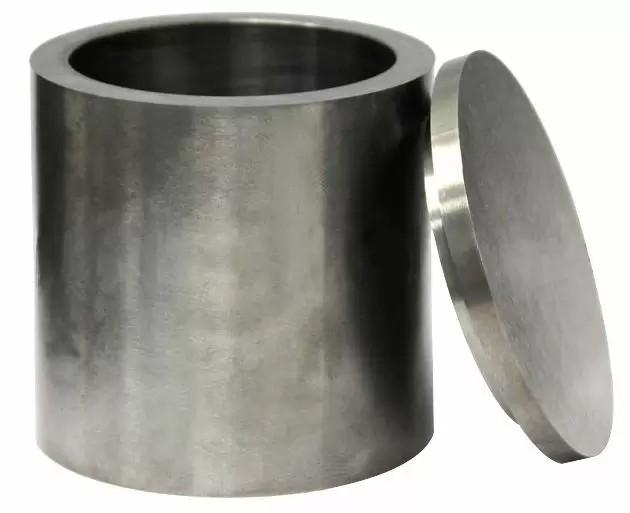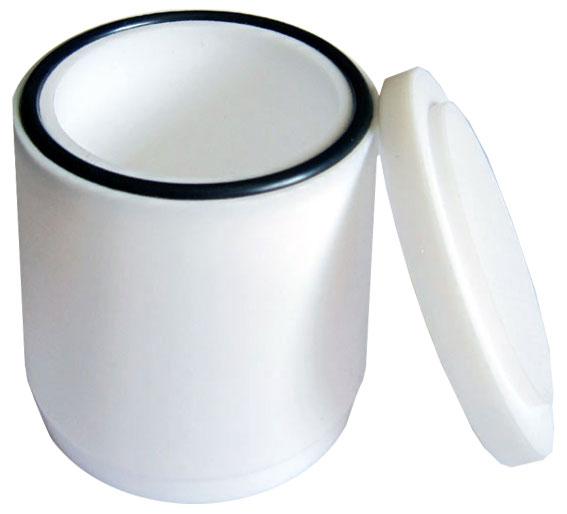A Comprehensive Guide to
Ball Mill Jars

A ball mill jar is a cylinder specifically designed to hold samples during laboratory-scale milling operations that use ball mills—a device used for grinding and blending materials. Samples that can be contained within a ball mill jar vary from powders to chemicals, ores, and other small materials. These jars are widely utilised in various scientific and industrial applications, offering a controlled environment for material processing and experimentation.
Ball mill jars come in different materials and capacities. Selecting the right one depends on the specific requirements of the milling procedure. Read our comprehensive guide below to help you make the proper choice for your unique needs.
What are the types of ball mill jars?
Jars for Wet Milling
Wet milling is a process in which a material is ground with a liquid and is commonly used in various industries for preparation, dispersion, and milling of materials. Jars used for this purpose need to be selected based on materials that are resistant to moisture and chemicals.
Jars for Dry Milling
Like the name suggests, dry milling involves grinding a material without the presence of liquid to aid in breaking down large particles into smaller ones. Since its primary purpose is to crush materials through mechanical forces, jars for dry milling are required to have high durability and wear resistance. Jars with good heat dissipation properties are also recommended to help minimise temperature rise during the milling process.
What materials are ball mill jars made of?
Porcelain Jars
Porcelain jars’ inertness and resistance to corrosion make them a common type to use in laboratories. They are also suitable for grinding or mixing high-purity materials.
Stainless Steel Jars
Durable and reliable, stainless steel jars are suitable for grinding harsh materials. They are also corrosion-resistant and are often used in applications where contamination from the jar material is a concern.
Nylon Jars
Nylon jars are used for grinding soft materials, polymers, and other substances that may be adversely affected by the jar’s components. Due to their non-reactive and non-contaminating properties, they are preferred in applications where the purity of the sample is required.
Agate Jars
Made from a chemical-resistant material called agate, these jars are ideal for grinding sensitive materials. Agate jars are commonly used in processes where the purity and non-contamination of ground materials are critical.
Tungsten Carbide Jars
Tungsten carbide is an extremely hard material, which makes tungsten carbide jars suitable for crushing solid materials such as metals, minerals, and hard alloys.
Polyurethane Jars
Generally, polyurethane is resistant to many chemicals, making it an excellent material for operations that involve solvents and reagents. These types of jars are also suitable for wet milling processes due to their resistance to moisture. However, they may not be ideal for high-stress applications, or those that require grinding hard and heavy materials.
Alumina Jars
Made from high-density alumina ceramic, these jars are resistant to wear and corrosion. They are also suitable for grinding abrasive materials such as minerals, ceramics, and metals.
Polyurethane Jars
Generally, polyurethane is resistant to many chemicals, making it an excellent material for operations that involve solvents and reagents. These types of jars are also suitable for wet milling processes due to their resistance to moisture. However, they may not be ideal for high-stress applications, or those that require grinding hard and heavy materials.
Alumina Jars
Made from high-density alumina ceramic, these jars are resistant to wear and corrosion. They are also suitable for grinding abrasive materials such as minerals, ceramics, and metals.
Zirconium Jars
Zirconium is a ceramic material known for its durability, high wear resistance, and chemical inertness. These properties make zirconium jars ideal for dry milling processes that involve hard and abrasive materials.
PTFE Jars
Polytetrafluoroethylene (PTFE) jars are highly resistant to chemicals and non-reactive with most substances, making them an excellent material for milling processes involving chemically sensitive materials, acids, or other corrosive substances.
What is a ball mill jar used for?
Pharmaceuticals
Ball mill jars are commonly used in drug development where a uniform and consistent mixture of powdered ingredients is crucial. These jars help in thoroughly blending substances to ensure that each dose of medication has a consistent composition.
Materials Science and Research
Scientists often need precise control over the particle size of their samples for various applications. Ball mill jars help them efficiently and effectively crush the materials into smaller and more controlled particle sizes.
Food Processing
In the food industry, ball mill jars are used to crush various spices and herbs essential for enhancing the flavour and texture of the products. These machines are also utilised to process nuts and seeds to create pastes and flours for the production of various food items, such as nut butter, spreads, and baking ingredients.
Mining and Mineral Processing
In mineral processing, ball mill jars are used for pulverising ores to extract valuable minerals.
Cosmetics
To produce a smooth and uniform texture in cosmetic products like powders, creams, and lotions, ball mill jars are commonly utilised to crush raw materials. Especially for products such as eyeshadows and blushes, ball mill jars are used to ensure a uniform distribution of colour.

How to Choose the Right Jar Size
Sample Size
Consider the size and amount of material that needs to be ground.
Ball Mill Size
Check the size of the ball mill. The grinding jar should match the mill size and the equipment’s specifications, ensuring proper fit and compatibility with the machine.
Material Density and Hardness
To avoid overloading the equipment, make sure that the density and hardness of the material can be accommodated by the ball mill jar. Higher-density materials may require a larger jar made of a more durable material.
Desired Particle Size
For tasks that require a specific particle size, choose a capacity that allows you to achieve the desired fineness without overloading the jar.
Jar Material
Different materials have different properties that affect the efficiency and result of the task. Choose a material that suits your milling needs.
How to Clean Ball Mill Jars
- Empty the contents of the jars completely and remove any remaining material using a spatula or scraper. You can use a soft brush or cloth to remove loose particles from the surfaces. Make sure no residues are left in both the interior and exterior.
- It is recommended to clean the ball milljars immediately after use to prevent the substances from drying and sticking to the surfaces.
- Use an appropriate solvent depending on the nature of the samples. Common solvents include water, acetone, ethanol, or other cleaning agents.
- If the substances have dried onto the surface, try carefully soaking the jar in a cleaning solution. Allow it to soak for a sufficient time to loosen the residues.
- Gently scrub the interior of the jar using a soft sponge or scrub brush. Remember to do it carefully to avoid damaging the jar, especially if it’s made from certain ceramics.
- Rinse the jar thoroughly with clean water to remove any residues. Repeat the rinsing process multiple times if necessary.
- Allow the jar to air-dry completely then store it in a clean and dry environment. Make sure that there’s no moisture left inside the jar before using it again.
Accessories can enhance the functionality of the Jars
Planetary Ball Mills
Planetary ball mills are typically the ones used in small-scale operations such as laboratory research. Compared to common ball mills that rely primarily on the friction of the grinding balls within the cylinder to break down materials, planetary ball mills generate high-energy impact due to its rotation around the central axis, similar to a planet.
Liners
Liners are used to protect the inner surface of the jar, providing a cushioning effect that reduces the impact and abrasion on the jar.
Cooling and Heating Jackets
These jackets are external casings that allow for the cooling or heating of the materials inside the mill jar. Cooling jackets dissipate the generated heat during milling, while heating jackets raise the temperature of the milling environment.
Digital Control Panel
Like a high-tech remote control, a digital control panel is used to adjust and regulate speed, temperature, and other settings. Upgrading to a digital panel can give you more precision and control over the milling process.
Frequently Asked Questions to Ball Mill Jars
What are the benefits of using high-quality jars?
Less Maintenance
High-quality jars made from durable materials can withstand the rigours of frequent use. Some are resistant to wear which is beneficial for dealing with hard or abrasive materials. This durability and resistance ensures a longer lifespan for the jars, reducing the need to frequently replace and maintain them.
Minimised Risk of Spills
A quality jar should come with a well-designed lid for a secure fit. This is to prevent leaks and minimise the risk of spills during the grinding process.
Warranty
Reputable manufacturers of high-quality jars often provide reliable customer support and warranties. This gives buyers confidence in the reliability and performance of the equipment.
Are ball mill jars are the same as grinding jars?
While they are often used interchangeably, there’s a distinction between the two in the context of milling equipment. A grinding jar typically refers to any container or vessel that holds the material and grinding media. A ball mill jar, on the other hand, specifically refers to the jars designed for ball mills.
What is a laboratory ball mill?
A laboratory ball mill jar is a type of grinder used to crush materials and samples such as chemicals, ceramics, glasses, and minerals into fine powder. Compared to industrial-scale ball mills, laboratory ball mills are smaller in size and are designed to break down small amounts of samples, typically in the milligram to gram range.
Where are ball mills used?
Ball mills are versatile equipment used in various industries, from drug development to food processing, science and research, mineral processing, and the production of cosmetics.
Which jar is used for grinding?
The choice of grinding jars depends on different factors, such as the material being processed, the size of the samples, and the specific requirements of the milling application. Commonly used jar materials include ceramics, stainless steel, nylon, agate, polyurethane, tungsten carbide, and alumina.
How to safely handle ball mill jars?
- When working with ball mills for the first time, start by thoroughly reading and understanding the manufacturer’s manual.
- Wear appropriate personal protective equipment (PPE) including glasses, gloves, and lab coat, especially when handling potentially harmful materials.
- Ensure that the jars are securely fastened to the ball mill to avoid any accidents during the grinding process.
- Follow the manufacturer’s recommendations for maximum load capacity. Do not overload the jars to prevent excessive wear and equipment failure.
- Clean the grinding jars thoroughly after each use to prevent contamination between different materials. Use separate ball mill jars for different materials if necessary.
Conclusion
Ball mill jars are indispensable tools for materials processing and sample preparation across various applications. Understanding the differences in each jar material and taking into account the specific requirements of the milling procedure ensures optimal efficiency of the process. Apart from selecting the right jar, knowing how to use it properly contributes to the longevity of the equipment and the overall success and safety of the procedure.
See What We Have to Offer
Across International offers various materials processing equipment for your laboratory needs. From ball mill equipment to fundamental ball mill accessories such as grinding jars and grinding balls, we provide cutting-edge equipment that meets the highest industry standards and contributes to the success of chemistry procedures across various industries.
For more information about our products, reach out to us at 1300 118 228 or Info@AcrossInternational.com.au.


